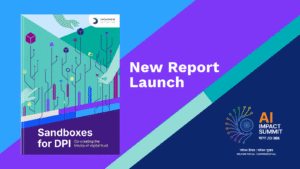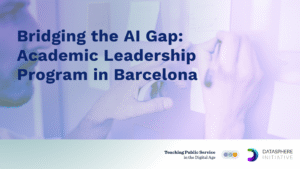On May 25, 2022, the Datasphere Initiative released a new report “Sandboxes for data: creating spaces for agile solutions across borders” produced with the support of the United Kingdom’s Department for Digital, Culture, Media, and Sport. The report explores the flexibility and experimental nature of sandboxes and how policymakers could use them to address cross-border data challenges.
The virtual launch event brought together over 80 professionals from 33 countries to react to the report’s findings and share the challenges and opportunities sandboxes could spark across sectors from trade, health, mobility, and biodiversity genomics.
Speakers from the Datasphere Initiative, United Kingdom’s Department for Digital, Culture, Media, and Sport, Government of Japan, Open Loop, World Economic Forum, and the Organisation for Economic Cooperation and Developed shared their experiences designing data governance policies and explained why more inclusive experimentation is needed to address the opportunities and challenges of data-driven economies and societies today.
The discussion explored how sandboxes could address cross-border data challenges and what opportunities and challenges may arise from their application.
Sandboxes have transferrable qualities for managing data-related challenges
Speakers at the event welcomed the new report as a starting point for policymakers to consider different types of sandboxes and how they can use them to build data governance solutions.
“I think there are key lessons from the report around the need to clarify as much as possible, and stakeholders need to be involved in this project.” said Morgane Donse, Deputy Director, International Data Unit, United Kingdom’s Department for Digital, Culture, Media, and Sport.
Broadly speaking, sandboxes are testing environments where hosted data can be accessed and used (“operational”) or collaborative processes where regulators and firms evaluate new technologies within a regulatory framework (“regulatory”), or a combination of both. The discussions highlighted how sandboxes can provide policymakers with a first-hand contact with the latest technological developments and solutions.
“We all have to think about how we combine the different policy tools, as well as enhancing technologies.” said Maiko Meguro, Principal Deputy Director, Unit of International Affairs, Commerce and Information Bureau, Ministry of Economy, Trade and Industry of Japan (METI).
There is a need to experiment with new solutions
Discussion at the event drew on the reasons why experimentation is needed to address data’s complex and intangible nature, recognizing policymaking has moved towards a new frontier.
“We need to find ways to narrow this space of uncertainty by experimenting in safe testing environments some of those solutions and get the evidence of which one works better.” mentioned Norberto Andrade, Global Policy Lead for AI Ethics, Open Loop.
Most of the technological development we have seen over the past few years is driven by data, whether we are talking about the Internet of Things (IoT), smart cities, or artificial intelligence technology. This puts data not just in the center of attention in terms of how economies are run and society structured but also calls for the need to design systems that accommodate its constantly-changing nature.
Speakers underscored the need to understand policy goals and move from concepts into action.
“It’s really important to think about the specific service or product and to think about what’s the best way to experiment with the policy framework.” said Molly Lesher, Senior Digital Economist/Analyst, Directorate for Science, Technology and Innovation, Organisation for Economic Cooperation and Developed (OECD).
Lessons can be drawn from policy and technical solutions
Drawing on examples of technology itself, speakers discussed how to leverage contextual and regional factors into the implementation of new more agile governance approaches. In addition, they highlighted the importance of creating a global network to share best practices and learn from each other.
“What’s really interesting about agile governance is that it can provide alternative solutions to regulation.” stated Anne Flanagan, Data Policy & Governance Lead, World Economic Forum Centre for the Fourth Industrial Revolution.
The challenges and risks of using sandboxes for data were also discussed particularly regarding the competition aspects that these new tools can give rise to as well as the difficulty of using them at scale, high cost and obstacles to getting funds, and other barriers such as the different understanding regulators form different countries.
The Datasphere Initiative will use this report as a springboard for pilots and partnerships
The Sandboxes project is a core part of the Datasphere Initiative Lab for Innovation Program – a collective space to experiment with and showcase innovations in governance frameworks and technical solutions.
“We’re looking for partners, regulators, policymakers, innovators, and stakeholders to contribute to this project as well, and to be part of the pilot projects that we really want to put together.” said Lorrayne Porciuncula, Executive Director, Datasphere Initiative.
Interested in learning more?
To help the Datasphere Initiative team solicit feedback on the report, its findings, and the potential for sandboxes for data we have prepared a short survey to gather input and expertise.
Please fill in this survey to share your expertise and indicate your interest to join the work.
Sign-up for the Datasphere Initiative monthly newsletter to learn more about similar activities and events.



